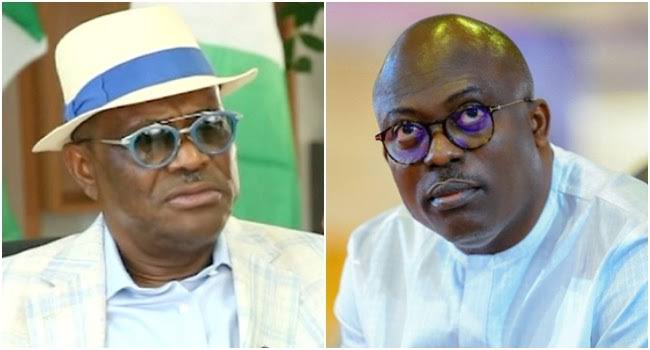
The build-up to the forthcoming local government elections in Rivers State has thrown the political landscape into heightened tension, as indications emerge that Governor Siminalayi Fubara’s loyalists are being sidelined while former Governor Nyesom Wike intensifies his grip on the state’s political machinery.
The polls, expected to serve as a litmus test for the two power blocs in the state, are already shaping up as a fierce battleground between the sitting governor and his estranged political benefactor. Sources within the state capital, Port Harcourt, say that while Fubara’s men appear “largely in the dark” regarding key arrangements for the elections, Wike and his allies have been strategically positioning themselves to retake control of the state’s political structure—this time with an eye on delivering Rivers for President Bola Ahmed Tinubu ahead of 2027.
Wike’s Calculated Moves
Political analysts note that Wike, who currently serves as Minister of the Federal Capital Territory, has never hidden his determination to remain relevant in Rivers politics. His enduring influence over the state assembly and his strategic alliances within the ruling All Progressives Congress (APC) point to an elaborate plan aimed at consolidating his base.
Reliable sources confirm that meetings have been held between Wike’s loyalists and top APC figures, with a focus on how to leverage the forthcoming LG polls as a testing ground for a stronger foothold in the state. “Wike is determined to show that he is still the master of the game in Rivers,” one source said. “For him, it’s about controlling the grassroots ahead of national politics in 2027.”
Fubara’s Camp in Dilemma
On the other hand, Governor Fubara’s camp appears to be grappling with uncertainty. Many of his aides and loyalists reportedly lack clarity about candidate selections, the role of the state electoral commission, and the broader strategy for the polls.
Observers say Fubara, though legally vested with executive powers, is contending with “political ambush” orchestrated by Wike’s camp, leaving his men unsure of their standing. The governor’s loyalists fear that without access to full election machinery, they may be outmaneuvered at the grassroots level—a critical base of legitimacy in Rivers politics.
Tinubu’s Interest
The involvement of President Tinubu looms large over the unfolding drama. Analysts suggest that Wike’s maneuvers are not solely for personal survival but also tailored to assure Tinubu of Rivers State as a secure political stronghold in future elections. By reclaiming control of the LG structure, Wike could guarantee that the state aligns firmly with the presidency, thus increasing his bargaining power within the APC and the national political space.
Rising Tensions Among the Electorate
Meanwhile, the Rivers electorate is watching with mixed feelings. While some fear that the fierce rivalry between Wike and Fubara could destabilize the state, others see the LG polls as a chance for the governor to prove his independence. Civil society groups in Port Harcourt have already called for a transparent and credible electoral process, warning that manipulation or exclusion could heighten political unrest.
What Lies Ahead
As the LG polls draw closer, all eyes will remain on Rivers State—the theatre of one of Nigeria’s most dramatic political tussles in recent times. Whether Governor Fubara can break free from Wike’s shadow or whether the former governor will successfully reassert dominance on behalf of Tinubu remains the question.
What is clear, however, is that the outcome of the elections will reverberate beyond Rivers, potentially reshaping the balance of power in the South-South and influencing the national political map as Nigeria marches toward 2027.








